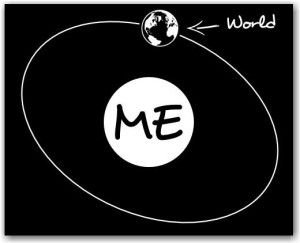I am reality, hear me roar...

During my MFA in creative writing, I had a few critique sessions with a Costa-Award-winning novelist. I learned a lot from him since, unlike most lecturers, who nodded sagely while the class gave feedback, he talked while we shut up. He was a successful literary writer, we weren’t, and learning from him was what I was paying for.
I remember one short story he critiqued. The first lines contained something like:
The sea beyond the window was unimaginably huge.
He told the author that “unimaginably huge” was a character’s opinion, not external reality, and fact and opinion should be clearly separated in fiction. He suggested something like:
The sea stretched out towards the horizon, glittering under the moon. He thought how unimaginably huge it was.
His argument was stories can feel claustrophobic when external reality is filtered though a character’s point-of-view. Even everyday objects, such as chairs, become matters of opinion – and the overall reading experience is like being trapped with a loud-mouthed jerk in a lift. By separating physical reality from opinion, the reader can stand beside the character (gazing at the sea) rather than being crammed inside their head like an alien bodysnatcher.
The Puppygate controversy dogging this year’s Hugo Awards for SF&F got me thinking about that MFA class. Yesterday Hugo finalist Annie Bellet withdrew her nomination for “Goodnight Stars” , which was on the Sad Puppy slate. Her short story was replaced (I think) by Thomas Olde Heuvelt’s “The Day the World Turned Upside Down”, which – of course – some Puppy supporters think is dreck.
I’ve read both stories, last year’s Hugo winner “The Water That Falls on You from Nowhere” and the now-infamous short “If You Were a Dinosaur, My Love”. They’re all well-written, but “Goodnight Stars” and the non-Puppy-supported stories differ in one important respect. And that’s their approach to external reality.
“Goodnight Stars” is about a woman called Lucy trying to return home from a camping trip, after the moon explodes and showers Earth with meteors. Lucy’s mother was on the moon, and her driving force is to discover if her mum is alive. The story feels *real* and moving because the moon is an external reality independent of Lucy’s emotional state.
“The Day the World Turned Upside Down” is also a disaster story in which the narrator tries to get back together with his girlfriend by rescuing her goldfish after gravity is reversed, causing people to fall off the Earth. The girlfriend rejects him, he can’t let go of her, and the story ends with him climbing down a rope ladder dangling into the void… Not letting go.
Here’s my problem with “The Day the World Turned Upside Down” (and the fantastical elements in “The Water That Falls…”). Not only does the reader lack access to external reality. There *is* no external reality.
Say you’re a soccer player who flunks a game. You’re still moaning that night in a pizzeria, and your teammate says “Stop crying over spilt milk, dammit!” Back at home, your fridge explodes, flooding the floor with semi-skimmed, and the next morning a passing milk truck crashes through your front wall.
You might start wondering whether you’re a fictional character, stuck in a gigantic metaphor for “getting over a past loss”, and with the power to unconsciously shape the stuff of reality into a reflection of your angst. The milk truck driver? Who cares about his feelings; the world revolves around you.
It’s obvious why the Puppies call these type of stories “message fiction”, especially when they’re political. Unlike in literary fiction where only characters carry the message, in SF&F the fabric of the universe can do so too. The loud-mouthed jerk *is* the lift.
Now *that’s* claustrophobic…
CORRECTION: “The Day the World Turned Upside Down” did not replace “Goodnight Stars”, but instead replaced the novelette “Yes, Virginia, There is a Santa Claus” by John C. Wright (hat tip to John C. Wright for the correction – see comments)
Image source: http://ccdumaguete.com/new/2011/06/25/the-heart-of-the-matter-the-who-of-worship/ Labelled for reuse.
